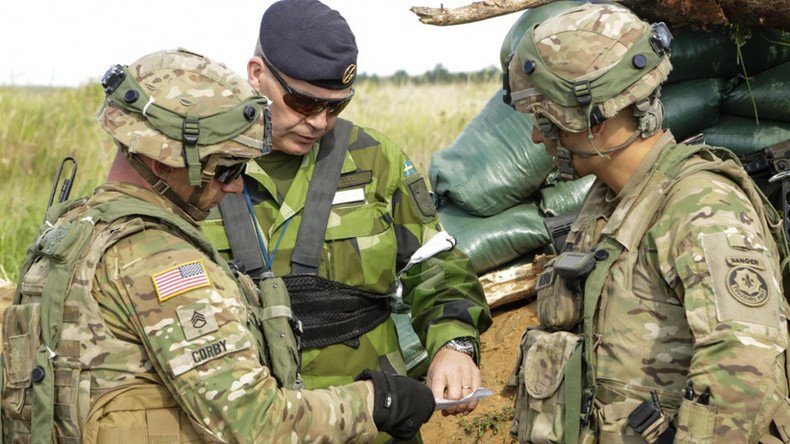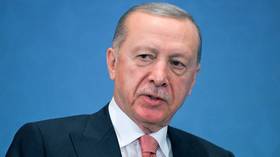$700bn Pentagon bill funds US presence in E. Europe & weapons for Ukraine

A Senate committee proposal for the 2018 military budget would further boost Pentagon spending on troops and equipment, make the US presence in Eastern Europe a persistent feature, and supply lethal weapons to Ukraine, among other things.
Adopted in the Senate Armed Services Committee by a vote of 27-0, the 2018 National Defense Authorization Act (NDAA) would add $97 billion to the total military budget proposed by President Donald Trump last month.
READ MORE: Winners & losers in Trump’s $603bn national security budget
Citing the need to “deter Russian aggression,” committee chairman John McCain (R-Arizona) shifted the funding for US deployments in Eastern Europe to the base Pentagon budget, and renamed it the European Deterrence Initiative (EDI). The NDAA also requires the Pentagon to submit future plans for the EDI, “including an assessment of permanently stationing troops in Eastern Europe.”
“In an unparalleled attack on our core interests and values, Russia engaged in an active, purposeful campaign to undermine the integrity of American democracy and affect the outcome of the 2016 presidential election,” said the summary version of the bill, published late on Wednesday. “The committee believes the United States must do more to deter Russian aggression, whether across its borders or in cyberspace.”
Washington has made a “pretty big statement” on its priorities by upping the European Reassurance Initiative funding by $1.4 billion, Defense Secretary James Mattis pointed out, referring to the White House’s original budget proposal and the current name of the program.
European nations are coming to grips with the realization that “Russia is not going to be a partner that perhaps we wished it could be in the 1990s, at least not in the near future,” Mattis told reporters after a NATO summit in Brussels on Thursday.
The $500 million earmarked for “security assistance” to the government of Ukraine includes “defensive lethal assistance.” However, half of this funding will be conditional on “substantial action” by Kiev to “make defense institutional reforms critical to sustaining capabilities developed using security assistance.” This would have to be certified by the US secretary of defense.
The 2018 NDAA extends the prohibition of military cooperation with Russia first imposed in 2014 – which, among other things, prevents the US-led coalition from coordinating operations against Islamic State (IS, formerly ISIS/ISIL) in Iraq and Syria. It also bans the Pentagon from using software developed by Kaspersky Lab, “due to reports that the Moscow-based company might be vulnerable to Russian government influence.”
Arguing that a massive increase in funding is necessary to “restore readiness, rebuild capacity, and modernize the force for future challenges,” the NDAA codifies a policy that the US Navy should have at least 355 ships of “the optimal mix” and calls for the construction of 13 ships next year, five more than in the White House request.
It also funds 94 new F-35 Lockheed Martin Joint Strike Fighters – 60 for the Air Force, 24 for the Marines and 10 for the Navy – altogether 24 more than Trump's budget requested.
Glad the #ndaa18 passed today, but I share this meme as a cautionary reminder. pic.twitter.com/TgueeAXzst
— Jack McCain (@McCainJack) June 28, 2017
The Senate markup calls for an additional 15,000 soldiers and 1,000 marines over Trump’s budget request and authorizes a 2.1 percent across-the-board pay raise for members of the US Armed Forces.
By far the biggest increase in funding relates to cooperative missile defense programs between the US and Israel, which would get $558.5 million more than Trump requested for a total of $705 million.
An earlier markup released by the House Armed Services Committee was $4 billion less, but still higher than Trump’s original budget proposal of $603 billion. All three proposals are much higher than the $549 billion spending cap under the 2011 Budget Control Act, and will require a deal with the minority Democrats to get passed.














